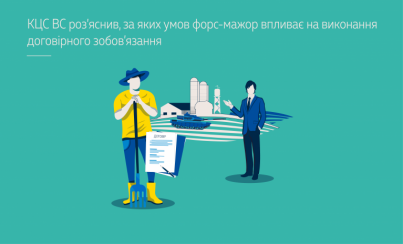Contact center of the Ukrainian Judiciary 044 207-35-46

The Civil Code of Ukraine does not provide for the construct of force majeure; in civil relations, force majeure is traditionally a contractual basis for exemption from liability. By means of an agreement, the parties may regulate, inter alia: the application of the force majeure construct in their relations (to which cases it applies, what are the legal consequences of its existence); what confirms force majeure; whether the existence of force majeure affects the performance of a civil legal obligation arising under such an agreement; how the existence of force majeure affects the time frame for the performance of a civil legal obligation arising under the agreement.
This conclusion was reached by a panel of judges of the Second Judicial Chamber of the Civil Cassation Court of the Supreme Court in a case concerning a claim for restitution of property transferred for safekeeping.
In September 2021, the plaintiff entered into a warehouse storage agreement with the defendant for sunflower seeds. Pursuant to the agreement, the plaintiff transferred the grain and paid in full for the storage services. In May 2022, the plaintiff sent a letter demanding the return of the grain, but the defendant reported force majeure: the elevator where the grain was stored had been seized by russian troops. In the pre-trial claim, the plaintiff proposed to the defendant to settle the dispute by returning grain of a similar nature or by reimbursing its value, but the claim was not satisfied.
The court of first instance, whose decision was upheld by the court of appeal, dismissed the claim on the grounds that force majeure made it impossible for the company to fulfil its contractual obligations.
The Civil Cassation Court of the Supreme Court revised the previous court decisions, outlining the reasoning behind them in the wording of its resolution, and reached the following legal conclusions.
In claiming the return of the grain accepted for storage, the plaintiff relied, inter alia, on Article 1212 of the Civil Code of Ukraine.
The grain storage agreement is valid; there is no evidence in the case file that the plaintiff applied to the defendant or to the court for its termination; the grain was not acquired by the defendant unfairly within the meaning of Article 1212 of the Civil Code of Ukraine, as it was transferred on the basis of a storage agreement, and the disputed legal relationship is not conditional. Therefore, the provisions of Article 1212 of the Civil Code of Ukraine cannot be applied to the disputed legal relations.
The court of cassation also noted that at the level of the Civil Code of Ukraine, the legislator did not regulate the use of the force majeure construct in civil relations. Traditionally, in civil relations, force majeure is a contractual basis for exemption from civil legal liability. However, this does not prevent participants in civil transactions from regulating their relations with due regard to the principle of freedom of contract. It is obvious that, with the help of such a universal regulator of private relations as a contract, the parties can regulate, in particular: the application of the construct of force majeure in their relations (which cases are covered by force majeure, what are the legal consequences of its existence: for example, the right to amend or terminate the contract); what confirms force majeure; whether the existence of force majeure affects the performance of a civil obligation arising from such a contract; how the existence of force majeure affects the time limits for the performance of a civil obligation arising from the contract.
In the agreement, the parties agreed that the time limit for a party to fulfil its obligations under the agreement would be extended by a period equal to the duration of the force majeure for that party, and stipulated that if the force majeure lasted more than one month, the parties could amend the terms of the agreement or request its termination. In other words, the parties to the transaction have determined how force majeure affects the timeframe for performance of a civil obligation and the legal consequences of force majeure (namely the right to amend or terminate the contract).
Under the agreement, the obligation to return the grain did not come due as a result of force majeure.
The Resolution of the Supreme Court of March 13, 2024 in case No. 686/16312/22 (proceedings No. 61-11710св23) - https://reyestr.court.gov.ua/Review/117823557.
This and other legal positions of the Supreme Court can be found in the Database of Legal Positions of the Supreme Court - https://lpd.court.gov.ua.